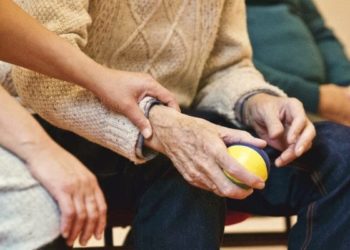Surgical repair improves survival and pain control in patients with dementia who suffer hip fracture
1. In this retrospective study, nursing home patients with dementia who had a hip fracture had improved survival if they underwent surgical repair compared to non-surgical management.
2. Patients with surgical management also had reduced pain and pressure ulcers, but use of antipsychotics and physical restraints did not differ significantly.
Evidence Rating Level: 2 (Good)
Study Rundown: Hip fractures in the older population remain an important cause of morbidity and mortality, with surgical management resulting in superior outcomes for most patients. Many patients with advanced dementia residing in nursing homes (NH) do not undergo surgical repair due to concerns of poor post-operative courses. This study sought to evaluate outcomes of nursing home patients with advanced dementia who had hip fracture who underwent either surgical repair or non-surgical management with regards to both mortality and patient important outcomes of pain and need for physical/chemical restraints. The study found that NH patients with dementia had improved mortality with surgical repair of hip fracture, as well as improved pain and lower rates of pressure ulcers. Rates of physical restraints and antipsychotic user were not different between the groups.
The current study provides further evidence that may help inform conversations between clinicians and patients or their decision makers, with surgical repair of hip fractures providing benefit in this population when other invasive interventions would not be considered. The main strengths of the study included its large size and data on pain and other patient-centered outcomes. The limitations of the study included the retrospective design, and reliance on Medicare claims for diagnoses, as some differences between surgical and non-surgical patients may not have been accounted for in the analysis. In addition, other important variables including time-to-surgery were not available.
Click to read the study, published in JAMA Internal Medicine
Relevant Reading: Hip fracture and the influence of dementia on health outcomes and access to hospital-based rehabilitation for older individuals
In-Depth [retrospective cohort]: This study was a retrospective analysis of the nationwide Minimum Data Set (MDS) database linked to Medicare enrollment files. The cohort included adults over the age of 65 with advanced dementia as defined by a Cognitive Performance Scale score of 5 or 6 who were long-stay resident (more than 100 days) of a nursing home, who were diagnosed with hip fracture as identified by diagnostic codes in Medicare claims.
Of the 3083 patients who were included in the study, 85% underwent surgical repair. At 6 months of follow-up 31.5% of patients who underwent surgery had died compared to 53.8% of those without surgery (adjusted hazard ratio [aHR], 0.88; 95%CI, 0.79-0.98). Among the survivors at 6 months, there was less documented pain for the surgically managed group (aHR, 0.78; 95%CI, 0.61-0.99) as well as fewer pressure ulcers (aHR, 0.64; 95%CI, 0.47-0.86). There was no difference in antipsychotic use or physical restrain use between the groups.
Image: PD
©2018 2 Minute Medicine, Inc. All rights reserved. No works may be reproduced without expressed written consent from 2 Minute Medicine, Inc. Inquire about licensing here. No article should be construed as medical advice and is not intended as such by the authors or by 2 Minute Medicine, Inc.






